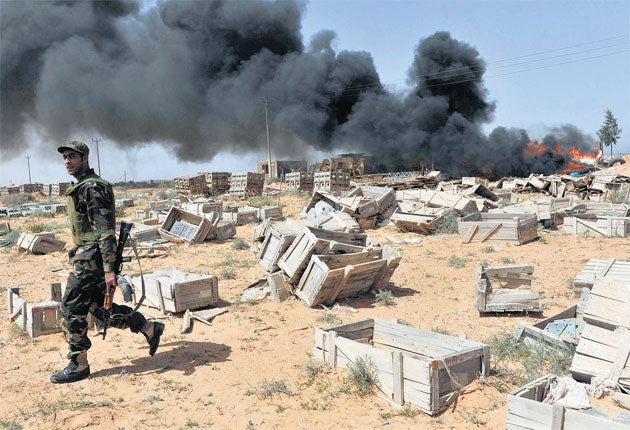The view from Sirte: Extra troops arrive for key confrontation
Donald Macintyre sees regime soldiers arrive in a symbolic and strategic stronghold

Your support helps us to tell the story
From reproductive rights to climate change to Big Tech, The Independent is on the ground when the story is developing. Whether it's investigating the financials of Elon Musk's pro-Trump PAC or producing our latest documentary, 'The A Word', which shines a light on the American women fighting for reproductive rights, we know how important it is to parse out the facts from the messaging.
At such a critical moment in US history, we need reporters on the ground. Your donation allows us to keep sending journalists to speak to both sides of the story.
The Independent is trusted by Americans across the entire political spectrum. And unlike many other quality news outlets, we choose not to lock Americans out of our reporting and analysis with paywalls. We believe quality journalism should be available to everyone, paid for by those who can afford it.
Your support makes all the difference.Libyan schoolgirl Ghada Imread, 16, is still in shock. Having spent five years in Newcastle Upon Tyne, where her father Othman was doing a PhD in engineering, she now finds herself in the middle of the next battleground between pro and anti-Gaddafi forces.
"I didn't get used to living here yet," she explains, with just a hint of a Geordie accent.
Ghada was one of those who came to Sirte's Al Mnara girls' school yesterday, unlike a sizeable minority who didn't, frightened, she says, by the coalition bombing strikes, of which perhaps a dozen could be heard throughout the city overnight. Did she agree with any of the professed aims – including a democratic Libya – of the rebel forces now advancing on her home town? "Some," she said, hesitantly. "People have different ideas and people should be able to listen to them. But they shouldn't use guns. We want peace."
Peace does not seem to be Sirte's immediate destiny. Yesterday afternoon reinforcements of more than 15 pick-up trucks carrying troops, machine guns and mobile anti-aircraft batteries could be seen arriving, along with a military jeep and a coach filled with soldiers.
They were travelling on the road from the west towards the Mediterranean port town, which Gaddafi has tried, among other things, to turn into a showpiece international conference venue. That being said, there was no sign of heavy armour or even regular soldiers in any number in the town itself. As we arrived on Sunday evening with government minders, we saw beside a few of the usual green flag waving young men with AK 47s in pick-ups, two buses filled with what could have been "volunteer" militia and mobile missile launchers beyond them.
The missile launchers were no longer there yesterday afternoon, which means they could have been moved towards the front line. Two tanks on a flatbed truck parked on the western approach road to the town on Sunday night were, suggesting that they had neither been mobilised nor targeted by coalition warplanes. Three armed revolutionary militia members, pausing in the city centre in a car muddied and covered with sand for night camouflage, said they were on their way to the front.
And the main mood, perhaps predictably, expressed inside Gaddafi's home town appeared to be one of defiance, laced with denial that the rebels could ever take Sirte as they had retaken Ras Lanuf and Bin Jawad.
The stated government purpose of our trip, to join a regime-backed tribal "peace drive" eastwards from Sirte, was aborted before we even arrived, the motorised march turned back by the advancing rebels.
Akram Jlassi, a highly-emotional taxi driver, said he had driven towards Bin Jawad to join the peace drive. "We told them we are all one family," he said, "but they told us: 'We don't want you, we don't want your plans'. They shot up my car and they shot a woman in front of us."
At the jetty of the small fishing port, the boats lying empty because of the flight of the Egyptians who man them, a small crater and the presence of missile fragments testified to what may have been a miss-hit by coalition aircraft and the most plausible case yet of civilian deaths from eight nights of air strikes, that of three young men whom relatives say were cooking a meal – and possibly lighting fireworks – at around 1am on Sunday.
Raja, the sister of one of the victims, Farha al-Hassan, an engineer, could be heard from a first floor window repeatedly wailing: "My brother has gone, where is he?"
The immediate family were said to be too angry with the media coverage of the uprising to speak to reporters, but a middle-aged cousin receiving mourners, Fathi al-Hassan, said: "This was not a military target. We were living in peace. God willing we will defend our country."
Whether from bravado, the presence of government minders or sheer idolisation of the town's most famous son, this last sentiment was repeated widely yesterday.
"I want to tell the Americans and British that Allah is stronger than your planes," said one resident, Fawzi Imish, 38. "There is someone stronger than the US."
Join our commenting forum
Join thought-provoking conversations, follow other Independent readers and see their replies
Comments